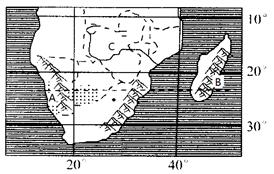问题
综合
读下列某区域图,回答有关问题。(9分)

(1)比较A、B两地(年平均)气温日较差的大小,并简要分析主要原因。(4分)
(2)C河是图示区域最大的河流,简述该河的水文特征。(5分)
答案
(1)A地气温日较差大于B地 原因:A地为热带沙漠气候,B地位热带季风气候;A地降水比B地少很多,晴天多,大气的削弱作用和保温作用弱,日较差大。
(2)该地为赞比西河,流域属热带草原气候,河流水量大;水位季节变化大;含沙量较大;无结冰期;落差大,水流急,水能资源丰富。
题目分析:第(1)题,根据图中的信息可以判定A为热带沙漠气候区,降水少,晴天多,大气对太阳辐射的削弱作用弱,保温作用也北,所以其气温的日较差较B大 。
第(2)题 简述一条河流的水文特征主要从水量大小、水位高低及其季节变化 、有无结冰期、含沙量的多少 、水能等方面进行
点评:本题的关键是对图示非洲中的A B C 三地的气候、地形等基本的自然地理特征比较了解
